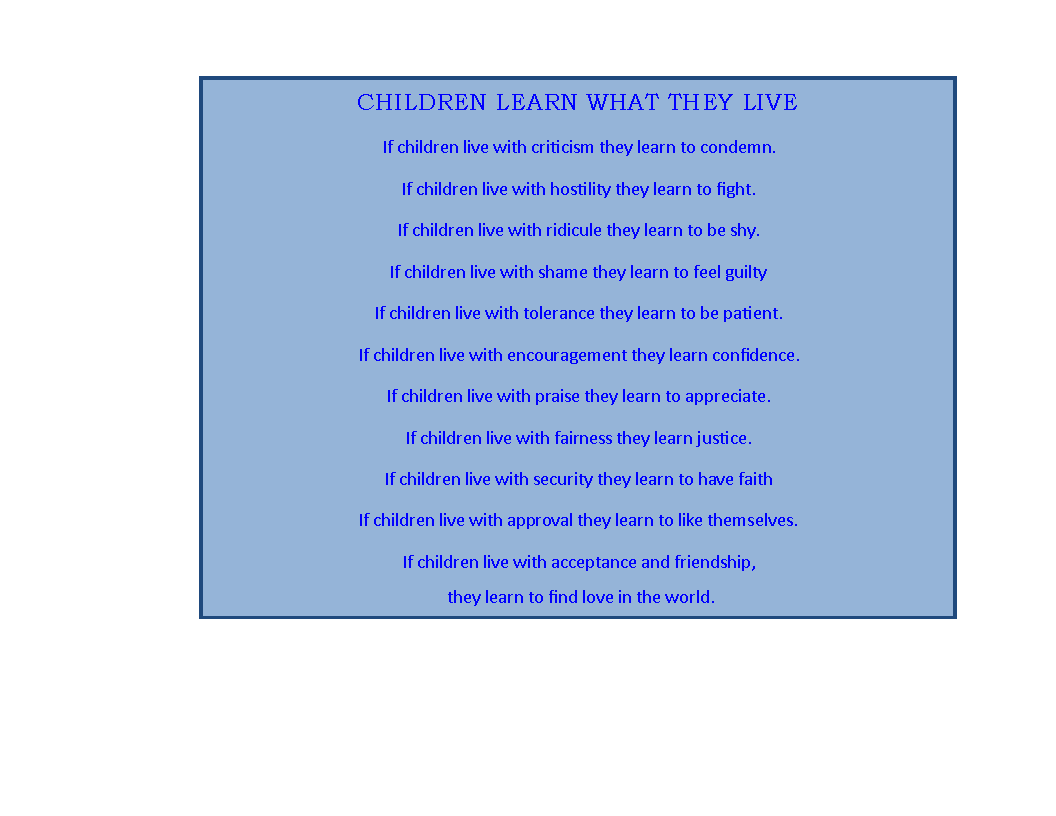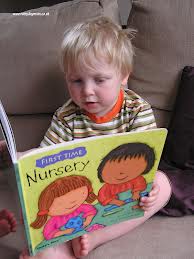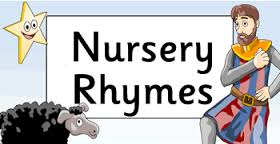
PARENTING 2 INSPIRE
Welcome to a website that offers a common sense approach to parenting. Managed by Beth Medway and Jean David, sisters with NNEB training and a wealth of experience not only raising their own families but also a lifetime working in residential nursery care, pre-school centres, nursery education, foundation classes, primary support roles, after-school care centres and more recently work as learning mentor and Higher Learning Teaching Assistant. The aim of this site is to provide help in pre-school preparation, in behaviour management, building of pre-school skills in literacy, numeracy, creativity and emotional intelligence. A tall order? Possibly, but here goes. The first steps are always the hardest. Our fundamental premise is that all children are different and we do not set out to offer the right answer. We offer a range of ideas that may work with your child.
Beth Medway

SOME BASIC TIPS ON PARENTING
Give lots of cuddles and
tell the children that you love them and how important they are
Set aside you and them time
each day when you’re not distracted with other things
Don’t ridicule, criticise or shame the child but try to praise even for small achievements.
Try to be tolerant and
patient even in adversity.
Encourage in all things but
don’t dictate.
Listen to the child and try
to understand them
Make lots of eye contact and show an interest in what they have done or have to say.
Try to sit together for at
least one meal a day.
Learn to stand back and let
your child build self-confidence
When it comes to seeking
advice remember that every child is unique and however convincing a particular
strategy sounds, you need to be flexible and be prepared for failures along the
way – just don’t worry and try something else
Praise and rewards – e.g.
charts and stickers – will beat the ‘naughty step’ any day
Teach natural consequences (see what happens when you throw the toy - it is removed).
Make the child feel
particularly safe at bedtimes with warmth and security in a happy routine
DISCIPLINE
Try not to raise your voice
and shout all the time but explain firmly why the child should behave in a
certain way
Don’t make a battle out of
everything
Be
consistent in applying discipline or giving rewards. Don’t confuse the child on
boundaries for behaviour.
The rule of 3 is useful to remember: give an instruction or warning to stop a behaviour then repeat the warning more firmly and finally intervene with the warning to stop the behaviour altogether.
Reserve the use of 'Time Out' for serious offences and try to avoid its use to deal with a temper tantrum.
You will have to use 'Time Out' a few times before it starts to take effect.
When building rewards charts try to choose up to three behaviours at a time (1. the most serious problem 2. One the child needs to improve and 3. one that the child has almost mastered). Reward with a token or sticker IMMEDIATELY (giving instant gratification and reinforcing positive behaviour). Allow your child to choose rewards.
Tell
the child what to do rather than what NOT to do: e.g. use “Stay on the path” not
“don’t go on the road.”
Try
not to laugh at naughty behaviour even when it may appear amusing. It will
unravel progress very quickly. Disengage and refuse to pay attention
Finally, when you see something in your child’s behaviour
that you dislike, ask yourself who most likely taught the behaviour. It was
probably you.
"If I Had My Child to Raise Again" by Diana Loomans

Jean David
 FOLLOW
THESE PICTURE LINKS FOR ADVICE ON:
FOLLOW
THESE PICTURE LINKS FOR ADVICE ON:

LANGUAGE DEVELOPMENT should run through most activities. Children quickly learn and will develop a wide vocabulary by hearing words used by adults. When watching TV talk about what is happening and why. Allow children to give reasons for what they see and get them to try to predict what might happen next. When reading together or looking at pictures, talk about what happened and what might happen next. Let the children use the pictures to tell the story. Talk about 'words'. Use words like 'title', 'author' and 'illustrator'. Get the child to look for another word like 'the' or 'a'. Treat it like a game. Use your finger to point and always reading left to right. This gets the child used to looking at letters and words. They become more confident and able to use language. When asking questions, repeat your child's answers. By doing this you will help your child to form sentences correctly.
ACTIVE LISTENING - Click on this link for ideas to improve a child's listening skills
NUMBER DEVELOPMENT is also important and can be done at all times. Count the stairs as you go up and down. How many sweets have you got? Setting the table ask if you have enough cups or spoons everyone. How many are having tea? Can you fetch me 3 biscuits? When shopping ask your child to get so many apples. Talk about money - even if the child has no concept of money and they will become familiar with the language. Building blocks can be counted and simple games played - using a large dice and letting the child count themselves. This also encourages social development in the need to take turns.
Nursery Rhymes play a key role in language and number development.

Nursery rhymes play an important role in early years learning as they encourage children to use rhyme, count, join in, remember and use repetition. This combines to increase memory and language skills. In number development counting rhymes build up a familiarity through number use as in "1,2,3,4,5,once I caught a fish alive"; "5 little peas in a pea pod pressed"; "1,2 buckle my shoe" and "5 little ducks went swimming one day". You Tube video examples can be found showing the actions that accompany the following rhymes: Five Little Peas ( https://www.youtube.com/watch?v=AKvtfZ_P-IA&feature=youtu.be ), Miss Polly ( https://www.youtube.com/watch?v=dgqAcioPH3Q&feature=youtu.be) and Ten Little Soldier Boys ( https://www.youtube.com/watch?v=wHl2nVajP00&feature=youtu.be ) Try to encourage creativity in rhymes and children's songs. For instance, add your own material to favourites like, "If You're Happy and You Know It" or 'The Wheels on the Bus" such as 'The people on the bus jump on and off'.
COLOUR DEVELOPMENT involves talking about colours. What colour is your jumper/dress? Play colour games whilst out and about. How many red cars can you see? What sweet is your favourite? What colour is it? Can you find me an orange one like this. Try colour lotto.
HOME-MADE PLAY DOUGH RECIPE
A Fun Read: The Hungry Giant by Joy Cowley
Guide to Potty Training
(click on the image)

EASTER ACTIVITIES
Guidance on interactive displays for younger children